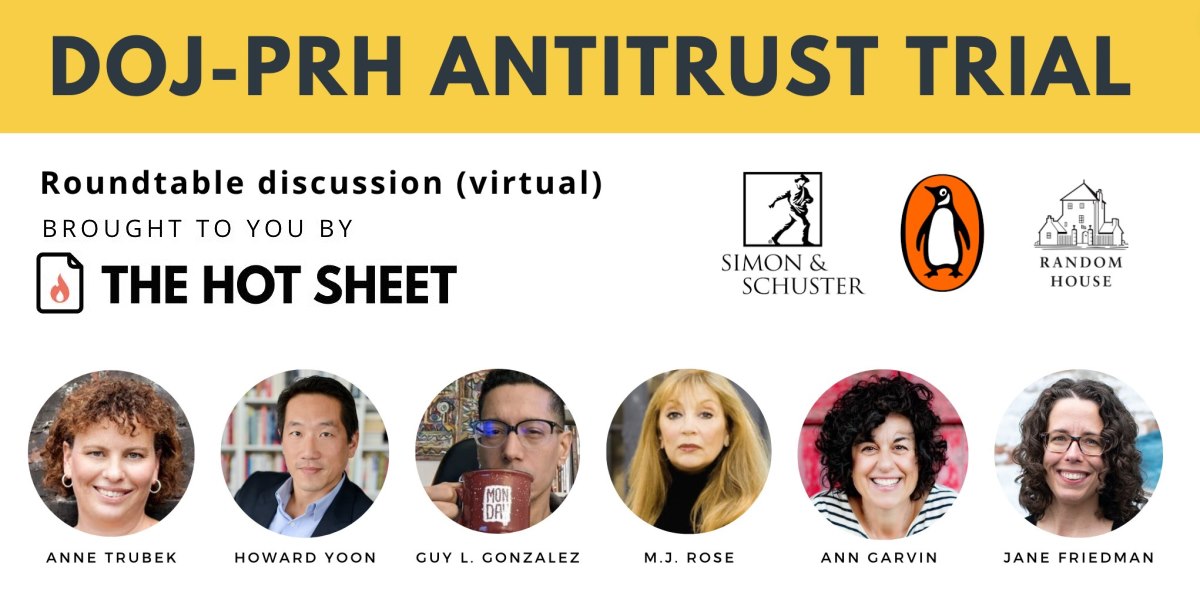I had the pleasure of participating in a virtual roundtable discussion hosted by The Hot Sheet and moderated by Jane Friedman, along with Ann Garvin, M.J. Rose, Anne Trubek, and Howard Yoon. The recording is below, along with my prepared comments for the key points we intended to discuss. The whole conversation is worth listening to, with great insights across the board, and some disagreements here and there.
For a copy of the rough transcript, click here: https://bit.ly/JF_DOJ-PRH
Did the DOJ Succeed in Making Its Case?
DOJ’s focus on big advances/monopsony was a calculated gamble, probably the only way an antitrust case was even possible because the actual glaring problems with the merger would simply be dismissed as Capitalism 101, but it’s the really least compelling argument to kill the merger, in my opinion. Throughout the trial, though, every publisher made it clear that the business is a crapshoot, P&Ls are wishful thinking, and advances are arbitrary, and the judge poked several holes in the defense’s financial guesstimates.
In its closing argument, the DOJ gave a passing mention to the merger leading to “less diverse books” and “new voices that will never get heard,” and I’m hoping the judge connects those dots.
What Happens if the DOJ Wins?
S&S combining with HarperCollins is still a bad thing, leading to a Big Two rather than a Big One, but, speaking from experience, S&S going to a private equity owner is arguably the worst option. That will most likely just lead to the Big Four cherry-picking their best imprints and backlists, and within five years S&S becomes another PE cautionary tale, like Toys R Us.
What’s frustrating is that S&S is a profitable company, making nearly a billion dollars in annual revenue, and the only reason this is happening is because publishing isn’t seen as profitable enough in the larger media ecosystem.
Importance to Authors
Again, in its closing argument, the DOJ gave a passing mention to the merger leading to “less diverse books” and “new voices that will never get heard,” and there was a great article in Vox this week that noted “the industry is 76 percent white and 95 percent of books published between 1950 and 2018 were written by white people.” Consolidation never supports diversity, and we’ve seen it regularly across the media landscape: when times get tough, it’s the diversity initiatives that get cut first, including staff that was hired in alignment with those initiatives.
PRH’s Market Share
The definition of “the market” was one of the slipperiest aspects of the trial. There’s plenty of competition for the midlist, like slot machines anyone with $100 has an equal shot at beating, but there’s very limited competition at the high stakes tables the DOJ chose to build their case around. The Big 5 only exist because of consolidation, particularly of lucrative backlists, not because they’re any better at publishing than any smaller publishers or even self-published authors. Just because PRH is in the position to buy back market share doesn’t mean it should be allowed.
Favorite Takeaway
The overall confirmation that the Big 5 aren’t inherently better or smarter publishers, they simply have more money to play with to take more risks and poach from the so-called “farm teams” when their more calculated risks pay off. And yet, the Big 5 remains resistant to anything more than token nods to diversity, or alternative revenue and royalty models, ensuring the broader industry remains relatively stagnant.
Do you like email?
Sign up here to get my bi-weekly "newsletter" and/or receive every new blog post delivered right to your inbox. (Burner emails are fine. I get it!)

